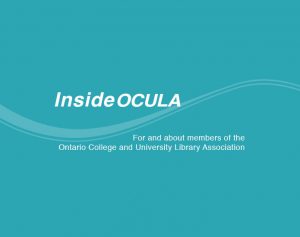OCULA President’s Message – Summer 2022
By Zack Osborne

Greetings, All! Well, wow; what a time to be alive. How are you all doing in these pandemic times? The last couple of years have been transformative, and I invite you to take a moment now to give yourself credit for your bravery, patience, strength, resilience, and for persevering through such unprecedented adversity. You are doing a great job, and I’m proud of you.
My name is Zack Osborne (he/him), and I’m excited to be writing to you as the OCULA President for 2022. In my day job, I work as the Manager of Health Information & Knowledge Mobilization with Unity Health Toronto, a network of academic teaching hospitals fully-affiliated with the University of Toronto. In my role with Unity Health, I lead a team of information specialists and library technicians supporting information and resource access, collaborating on evidence synthesis projects, and fulfilling the learning needs of over 6000 students each year, along with researchers, physicians, nurses, and all hospital staff. In 2021 I also began teaching as a sessional lecturer with the Faculty of Information (iSchool) at U of T. I possess a genuine excitement and curiosity for library work and library people, and over the years have leveraged volunteerism with the Ontario Library Association to help satisfy that aspect of my professional interests. For many years I served on the OLA Super Conference Planning Team as a planner (2015-2016), volunteer coordinator (2017-2018), and conference co-chair (2019-2020). In 2020 I joined OCULA Council as the President-Elect.
Due to the COVID-19 pandemic, the 2020 OCULA Council members committed to extending their terms for an additional year. I want to take a moment to express my gratitude for that continued involvement and leadership to those council members during such a challenging time. To Abeer Siddiqui (McMaster University), Aliya Dalfen (Humber College), Cyndi Smith (Georgian College), Rob Makinson (University of Toronto Mississauga), Oy Lein “Jace” Harrison (Indigenous Innovation Initiative – i3), and Andrew Colgoni (Brock University) thank you so very much for staying in your term for an additional year on OCULA Council. I also want to specifically thank Angela Henshilwood for her two-year OCULA presidency (2020-2021) where she led with patience, fortitude, empathy, and a contagious positive attitude. I’ve learned so much from Angela, and the Council benefited from her calm and stable leadership in these turbulent and unexpected months and years.
I’m thrilled to serve as President this year alongside the new OCULA Council, of which there are new and familiar faces. I’d like to take the opportunity to introduce your new President-Elect, Graham Lavender, Councillors-at-Large Savannah Li (Ministry of the Attorney General), Jordan Bulbrook (Brescia University College), and Tiffany Miller (Confederation College), and welcome back to former OCULA President Melanie Parlette-Stewart (University of Guelph) as the new InsideOCULA Editor-in-Chief. Please visit the OCULA Council webpage to meet the new Council. I am very excited for this year, to continue delivering relevant programming, fostering community, and also working to improve internal Council processes behind the scenes.

Earlier this year I learned about the vision and practices of “slow librarianship” from a Circulating Ideas podcast episode featuring Meredith Farkas, and the 2017 source article by Julia Glassman. Slow librarianship, defined by Farkas, “is an antiracist, responsive, and values-driven practice that stands in opposition to neoliberal values. Workers in slow libraries are focused on relationship-building, deeply understanding and meeting patron needs, and providing equitable services to their communities. Internally, slow library culture is focused on learning and reflection, collaboration and solidarity, valuing all kinds of contributions, and supporting staff as whole people. Slow librarianship is a process, not a destination; it is an orientation towards our work, ourselves, and others that create positive change. It is an organizational philosophy that supports workers and builds stronger relationships with our communities.” Further, Glassman proposes that “if we reject the capitalist drive to constantly churn out new products and instead take a stand to support more reflective and responsive practices, we can offer our patrons services that are deeper, more lasting, and more human.” These visions resonated with me strongly, as I frequently and unconsciously (without sufficient reflection or intervention) succumb to “the race to innovate”. Among the many valuable lessons from these pieces, the simplest and strongest takeaways for me are the importance of reflection, and slowing down to more intentionally and consciously serving the library’s stakeholders and end-users, and ourselves. Consequently, for 2022, OCULA is building on the work from the last two years in areas of equity, diversity, and inclusion (EDI), through the EDI Community of Practice (CoP) chaired by Heather Buchansky (University of Toronto) and Graham Lavender. Council is also very proud of the 2022 OCULA Spring Conference, “Neurodiversity in the Library: Providing equitable, welcoming, accessible, and inclusive spaces and services“. You can access the conference recordings online. The primary objectives of this conference theme were to draw awareness of neurodiversity among students and library staff, to de-stigmatize neurodivergent conditions, and to share actionable takeaways for library leaders and staff to foster inclusive spaces, services, and workplace practices to achieve equity for all. Additionally for 2022, Council will be working to refresh and re-imagine the OCULA website, actively drive new membership, reconsider and revive our Awards process, and continue to deliver free webinars.
If you have any questions, ideas, or comments, I look forward to hearing from you! I can be reached at zachary.osborne@utoronto.ca, and welcome any input you’d like to share with me.
Very best, and take good care.
-Zack
Zack Osborne is the Manager, Health Information & Knowledge Mobilization at Unity Health Toronto.


